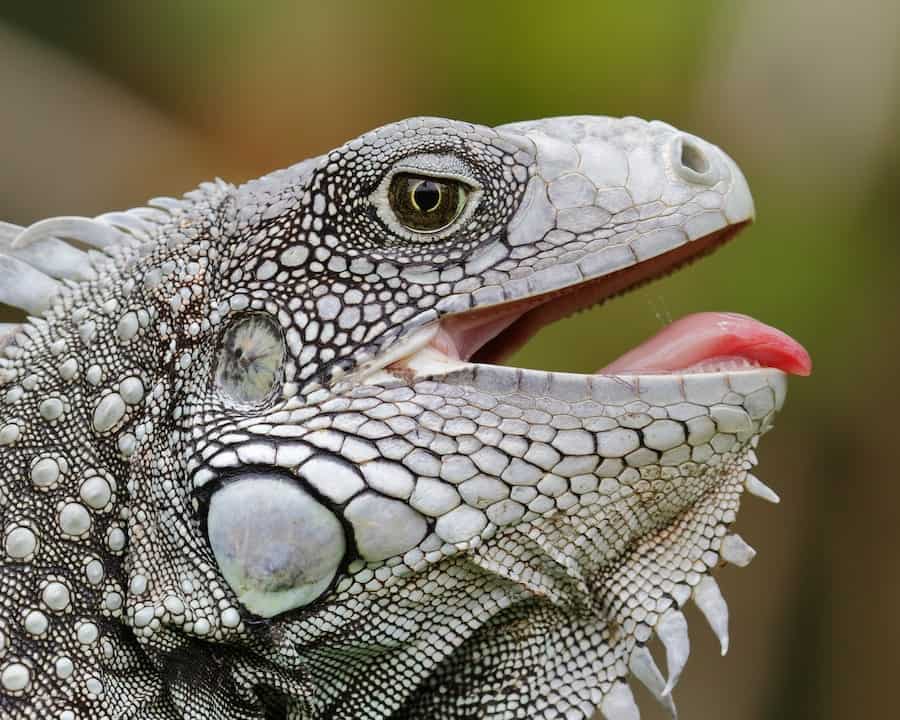Are you wondering whether iguanas have teeth? If you’re thinking of bringing home an iguana, you may be worried about getting bitten or having to take care of their oral hygiene.
Iguanas do have teeth, which they use to tear apart plant matter and defend themselves. These reptiles replace their teeth often and generally only bite in self-defense.
In my guide, I’ll explain why iguanas have teeth, what they look like and how to care for them.
Do Iguanas Have Teeth?
Iguanas do have teeth, even if they are difficult to see. They use their teeth to tear and chew plants.
Iguanas can have anywhere from 80 to 120 teeth, with 20-30 teeth in each quadrant. They look similar to the serrated edge of a knife and are all the same size.
Because all of their teeth are the same size and shape (and exceptionally sharp), they’re incredibly efficient at tearing plants.
Reptiles like the iguana have one of three different types of teeth:
- Thecodont
- Pleurodont
- Acrodont
Iguanas have pleurodont teeth, which means they have shallow attachments to the surface of the jaw.
Pleurodont teeth don’t have deep-set sockets like human teeth. Over time, they wear down and are replaced with newer and sharper teeth.
These new teeth grow behind and just underneath the iguana’s old teeth.
Do Baby Iguanas Have Teeth?
Yes, baby iguanas have teeth. In fact, baby iguanas are born with fully formed teeth to help them break out of their shells.
Like humans, iguanas lose their baby teeth. They begin growing new teeth just a few months after birth. Throughout their first year of life, iguanas may replace dozens or hundreds of teeth.
Do Iguanas Replace Their Teeth?
Even as adults, iguanas still replace their teeth. Over time, their pleurodont teeth wear down and are replaced with a new set of teeth.
Iguanas are known for having a rapid rate of teeth replacement. In fact, their teeth are replaced up to five times per year, which means that an adult iguana may replace 500 teeth in a year.
Did you know that iguanas can also replace their tails? I recently wrote a post entitled, “What to do If Your Iguana’s Tail Falls Off,” where I talk about why their tails fall off and whether they grow back.
What Do Iguana Teeth Look Like?
Iguana teeth aren’t quite as big as those found on other reptiles, like crocodiles. They’re small and short – just like the edge of a serrated knife.
They may not be easy to see, but you’ll certainly feel an iguana’s teeth if they bite you. Along with being sharp and serrated, an iguana’s teeth are:
- Triangular in shape
- Translucent
- Thin
- Broad
- Closely set
A baby iguana’s teeth are so translucent that they almost look clear.
But why are their teeth so small?
As you know, iguanas are herbivores. In other words, they eat plants. Their diet consists of leaves and flowers. These small, sharp teeth are perfect for tearing plant matter apart.
Iguanas use their slightly forked tongues to taste the world – just like snakes and other reptiles. Their tongues collect little molecules that send signals to the Jacobson’s organ in their mouth.
Once they’ve figured out that a leaf is a piece of food, they’ll reach out and grab it with their tongues, which are full of sticky saliva. Then, they use their razor-sharp teeth to tear the leaf apart.
Iguanas have to break their food down into bite-sized pieces. Because they don’t have molars (which grind food), they’ll move food around in their mouths and use their sharp teeth to break food down.
Iguanas can also use their teeth for defensive purposes. When they feel threatened, these reptiles can use their teeth to puncture the skin of other reptiles, animals or even humans.
Are Iguana Teeth Sharp?
Iguanas have a lot of teeth, which we’ll discuss shortly, but are they sharp? Yes. While iguanas may look calm and relaxed, they’re also very fast, agile and defensive.
According to National Geographic, green iguanas have:
- Razor-sharp teeth
- Powerful jaws
If you read my recent guide, “Are Iguanas Herbivores? Feed Your Iguana The Right Way,” you know that iguanas are primarily herbivores with a few exceptions throughout their lives. So, why do they need sharp teeth?
They use their teeth to shred and grind the plants that they eat.
Some plants are tougher than others, so iguanas also have very powerful jaws to deal with these sturdier plants. However, they also have very powerful jaws.
I remember my friend telling me that their iguana bit them, and I thought he was overreacting to the pain that he felt. He wasn’t. An iguana’s bite can hurt because they’re armed with very sharp teeth and powerful jaws.
If you care for your iguana properly and take the right approach to handling him, you won’t need to worry about him biting you.
How Many Teeth Does an Adult Iguana Have?
Iguanas have razor-sharp teeth, but how many of them do they have exactly? I haven’t sat there and counted the teeth in my iguana’s mouth, but there are a few facts that I do know about these reptiles:
- An iguana’s mouth is divided into four quadrants, much like a human’s mouth
- Each quadrant in the mouth can have 20 – 30 teeth
Based on these figures, your iguana can have anywhere from 80 to 120 teeth in their mouth.
Why do some iguanas have more teeth than others? No one really mentions this in any of their literature. It may be because of the size difference between certain iguanas, and an iguana with a larger mouth may have more teeth than a smaller reptile.
Interestingly, as the iguana grows larger, you’ll notice that its teeth seem to get larger, too. If your adult iguana has a strong bond with you, he may allow you to count the almost-transparent teeth in his mouth.
Do Pet Iguanas Require Dental Hygiene?
Many pets need their teeth cleaned, even dogs. Iguanas use their teeth to break food down with a few bites so that it can be digested with greater ease. However, you won’t need to worry about your iguana’s dental hygiene because:
- They eat a diet that is high in plants, which do not cause teeth to decay.
- Iguanas replace their teeth up to five times per year.
Due to the rapid replacement of their teeth, iguanas will not require any additional care from humans to care for their teeth, aside from a quick check (more on this below). You will need to have a good rapport with a veterinarian because your iguana can suffer from:
- Mouth rot, or when food becomes lodged in the iguana’s teeth and begins to rot. Food can also cause small cuts in the mouth or on the gums of the iguana.
- Infection can set in if mouth rot or other issues occur.
Mouth rot is the main dental concern for an iguana, and it’s important for you to monitor them for this condition because it can become fatal. What you need to do is check the iguana’s mouth for food particles that may become stuck between its teeth and gums.
You’ll also want to examine their oral tissue for any cuts that can turn into an infection or rot if they’re not cared for properly.
A few signs that your iguana may have mouth rot include:
- Swelling of the gums, mouth or face
- Lack of interest in food
- Thick saliva
- Yellowish pus around or in the mouth
- Plaque on the mouth tissue, which is also yellow
A veterinarian will examine the iguana’s mouth and determine if they have mouth rot. If he does have rot, cleaning the infected area and administering antibiotics will help resolve the issue as quickly as possible.
Can Iguanas Use Their Teeth to Bite You?
Yes. Iguanas can bite you, and they will often bite if you handle them improperly or if they’re uncomfortable with you. I have seen many first-time iguana owners get bitten by their reptiles because they rushed into their enclosure too quickly or mishandled their pets.
A few tips to avoid being bitten by your iguana are:
- Avoid placing your fingers too close to his mouth until he’s very comfortable with you
- Handle the iguana properly by placing your forearm under his belly and providing him with good support
- Pick the iguana up from the side rather than trying to grab him from the front
- If the iguana is a new pet, be sure to allow him time to feel comfortable with you before rushing into his enclosure
- Learn to read his signals and body language to know when he is mad or irritated. You can read my guide on stressed iguanas, titled “15 Signs an Iguana is Stressed.”
An iguana bite does hurt, but they’re unlikely to take off your finger or cause some of the serious damage that you read about on forums. Most bites will be painful, but for an adult, they’re not much to worry about.
I did write an awesome guide on this topic, titled “Can Iguanas Bite a Person’s Finger Off?,” that I recommend you read.

